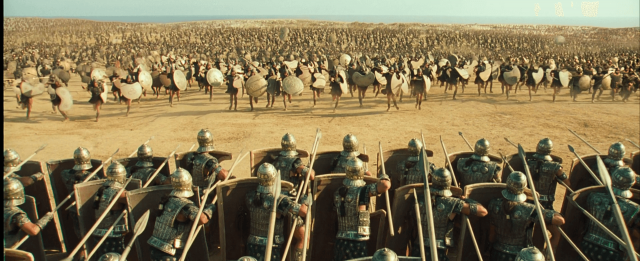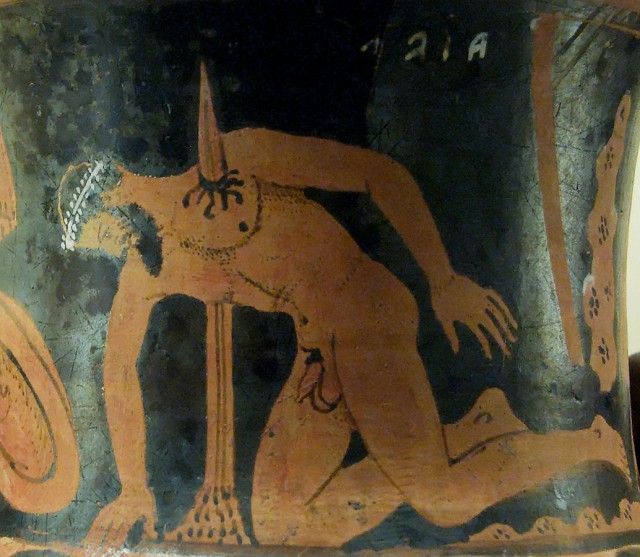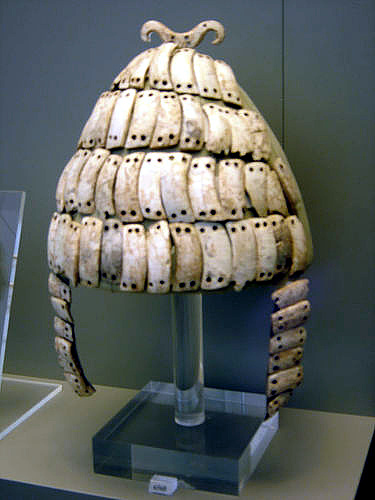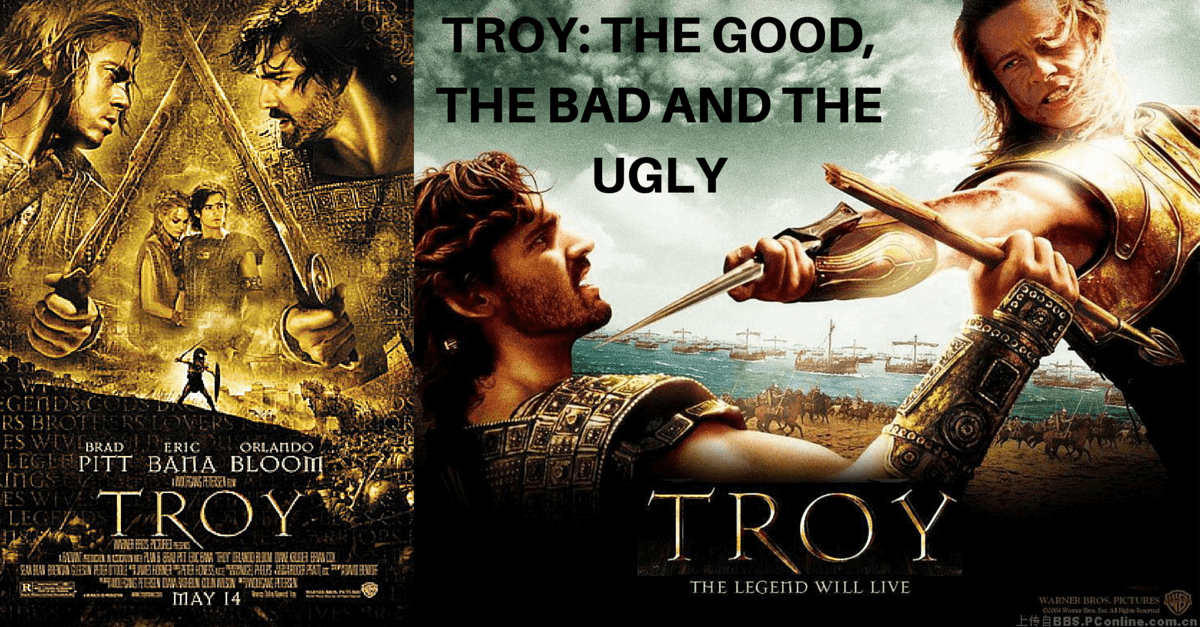The 2004 epic film Troy catches quite the break when it comes to historical films; most of the true history of the Trojan War is still unknown so many liberties could be taken by director Wolfgang Petersen. Looking at its historical accuracy, we can find the good and bad representations as well as the truly ugly decisions that truly twist history.
The Good
As Hollywood historical epics are all about the drama it works out well that the spectacle and drama of the war was just as real then. People paused to observe single combats between the heroes and the movie does a great job of showing the drama from those combats to the extravagant funerals (though it was a little too early for the coins on the eyes) to the interpersonal relationships between such characters as Achilles and Agamemnon.

Many aspects of the fighting presented are laughably wrong, and we will get to that but an interesting aspect of Homeric warfare was the distinct possibility of mixed tactics from open order one on one fighting to closed formations that could have been precursors to later hoplite formations.
Though there are still debates about how battle commenced during this period, the film shows a variety of styles from open order combat on the beach to the closed shield wall of the Trojans later fighting in front of their walls. The hero combat definitely played a role and the way it is presented in the film is tough to criticize. Even the one on one combat to decide the battle in the opening scene has historical precedent in both Greek and Roman history/legend.
Though tough to pinpoint a scene specifically, the movie does a good job is showing that this is Bronze-Age, harsh Greece, not the later civilized Greece. It is difficult to describe the difference but the movie does a good job to show that this wasn’t necessarily the most cultured period of Greek history.
If anyone watching the movie thought Paris was a bit of a coward, you’re not wrong. In the Iliad, Paris is presented as quite the coward, he fights, but prefers to use the bow and arrow from a safe distance. Paris fleeing from Menelaus is a scene in the Iliad and it was Paris (in most accounts) who hit Achilles with the arrow.
The Bad
The director might be friends with George R.R. Martin, he doesn’t seem to care who he kills, or when they die. The Hector vs. Achilles storyline is actually fairly accurate but many other deaths are not. Both Agamemnon and his brother Menelaus survive the war in the Iliad. In Menelaus’ duel with Paris, Paris simply escapes the fight, no Hector stabbing him.
Agamemnon is killed, but by his wife when he returns to Greece. Paris, shown taking Briseis to safety in the movie, is actually killed during the war. Many other characters shown either don’t survive, or are killed far from when they supposedly died. Ajax wasn’t killed by Hector, he killed himself in sorrow after Achilles was killed, and Achilles died before the Trojan horse was built.

The relationships of the characters is also a bit off as well. Achilles and Patroclus were not cousins, they were actually good friends and possibly lovers. Patroclus was actually older than Achilles as well. Briseis is a major character of the Iliad and may have had a similar relationship with Achilles as portrayed in the movie, but she was not related to the princes Paris and Hector.
Helen says in the movie that she was sent to marry Menelaus when she was 16 and Sparta was not her home, but she was actually a Spartan princess, born and raised in the city, Menelaus became the King of Sparta by marrying Helen. Lastly, while Aeneas is shown briefly in the end of the movie true to the story in escaping, the Iliad’s Aeneas was a hero in his own right and actually had a fight against Achilles.
The Ugly
With the Trojan War almost universally accepted as either the 10 year siege of Homer’s telling or several smaller engagements over many decades, the filmmakers decided on neither, instead showing the War play out over a few weeks. The time crunch makes sense as even when shortening the war, the movie was still three hours long, but many aspects of the war are simply not mentioned.
The Greeks took several towns and cities around Asia Minor and Thrace, even Achilles got into the action there. Nothing is mentioned about the terrible time the Greeks had simply sailing to Troy either. Also much of the action that directly involved Troy took place at the beginning or end of the ten year siege, it wouldn’t be too difficult to show a time lapse within the movie.
Though the movie does a decent job of showing one of the theories of Homeric warfare, the details of the fighting are often incorrect. The late Bronze Age weapons were well represented in the props, with several of the sword designs pulled straight from ancient models but the method of their use is not shown well. Bronze swords could hold a decent edge, but they were prone to shattering or snapping.
A sword stab was possible but going all the way through the chest was unlikely as the tips were usually rounded and there was a chance of damaging the sword. Most wounds from bronze swords were broken bones as the heavy swords came down almost like a club. Not once in the film do we see a shattering sword.

The armor of the film is also a travesty; not only does it not fit in well with any era, but it is wholly ineffective through the entire film. Important/rich men like Menelaus or Hector would have had some sort of composite of layered linen or leather with several small plates of bronze, or even solid bronze brestplates, but the average soldier might only have a small solid plate of bronze slung across his chest no bigger than the plates used in modern bullet proof vests.
Furthermore, the elegant armor worn by such characters as Menelaus would have been extraordinarily difficult to pierce with a bronze sword. Armor was worn for a reason, but it seemed to be just for show, and to help the audience know who was Trojan and who was Greek. Also listening to the movie, the arrows make a distinctive spring noise that no wooden arrow should possibly make.
Though at the time he was considered an honorable, and cunning man, Odysseus actually committed some atrocities that would be shocking today. Angry at a fellow Greek for dragging him into this war, Odysseus framed the man as being a Trojan agent and had him killed for treason, other versions have him tricking the man into believing there was treasure at the bottom of a well and then burying him once he got down there.
Odysseus was also the man who killed the infant son of Hector as the city fell. Odysseus even attempted to feign insanity to get out of going to the war in the first place. Though he was indeed wise and often level headed, he wasn’t quite the good guy he was made to look like in the film.
There are countless other inaccuracies and plenty of funny mistakes to be found, like the Greek army extra who takes a tumble as the army charges for the first big battle. Overall the movie does a decent job showing one interpretation of a possible conflict that we simply don’t know much about.
It plays around with the source material to make a more grounded, modern story and tries to keep the downright ugly flaws to a minimum. Definitely worth a watch, or a reviewing, knowing what the movie does right and wrong, and that Hector-Achilles duel is quite the spectacle.
By William McLaughlin for War History Online
